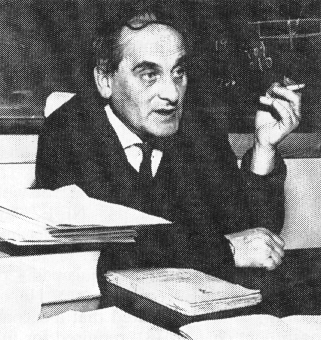

Beppo is the nickname of Giuseppe Occhialini.
Giuseppe Occhialini was born in 1907 in Fossombrone (Pesaro) and graduated in
Physics at the University of Florence in 1929.
The years in Florence, in the group of young scientists around E. Persico,
B. Rossi and G. Bernardini, were very important for his formation.
At the age of 24 he joined the Cavendish Laboratory
in Cambridge, under the supervision of Patrick M.S. Blackett to learn
the Wilson chamber technique.
He brought to the Cavendish the coincidence counter technique, pioneered
by Bruno Rossi, and applied it to the Wilson chamber.
The famous picture of the electromagnetic shower published in 1933 was
obtained with this device. That work provided a confirmation of the
discovery of the positron by C. Anderson and explained his properties in the
framework of the relativistic theory of the electron formulated by Dirac.
Beppo came back to Florence in 1934 and few years later he moved to
the University of S. Paolo in Brazil, invited by G.Wataghin who was
starting with some students a research program on cosmic rays.
At the beginnig of the war he had to leave his position and he took
refuge in the Itatiaya mountains, near S. Paolo.
Then, before coming back in Europe, he was for one year in a Biophysics
Laboratory in Rio de Janeiro.
At the end of 1944 he went to the Will Laboratory in Bristol UK
to collaborate with Cecil F. Powell.
There, using a novel approach involving the use of
photographic emulsions for detection of elementary particles,
he contributed to the discovery of the pi-meson decay in 1947.
In the last months in Bristol, in collaboration with his future wife
C. Dilworth, improved the technique of developing emulsions and
studied new emulsions of high sensitivity.
Blackett (in 1948 "for his development of the Wilson cloud chamber
and his discoveries therewith in the field of nuclear physics and
cosmic radiation") and Powell (in 1950 "for his development of the
photographic method in the study of nuclear processes and for his
discoveries concerning mesons") separately won the Nobel Prize for
their work on elementary particles. Both awards were made in
difficult, Cold War years, and Occhialini had never made a secret of
his political ideas. Pontecorvo summed it up nicely, in a famous
toast: "I drink not to Beppo, but to us all: may we collaborate with
him, it is a practically sure way of winning a Nobel Prize".
In 1950, after two years in Bruxelles, Occhialini became professor at
the University of Genova and two years later he moved to Milan.
Research groups were founded in these places under his leadership
obtaining a great scientific production.
Some results were obtained through internatonal collaborations (as
the `G-stack collaboration').
He founded and became first director of LFCTR (which later became IFCTR;
this institute is now named after him: Istituto di Fisica Cosmica e
Tecnologie Relative "G.P.S. Occhialini").
Beppo, together with E. Amaldi and others, played a crucial role
in starting the European Space Research Organization, and in giving an
impetus to its scientific programme, from which the present-day
European Space Agency still benefits. He was one of the founding
fathers of the COS-B projet. The European Physical Society appointed
Occhialini in 1993 (its 25th Anniversary) as one of their Honorary
Members.
In a sad coincidence, Giuseppe (Beppo) Occhialini died on 30
December 1993 within a few weeks of Bruno Rossi and a few months of
Bruno Pontecorvo, three of the greatest Italian physicists of the same
cultural generation.
 |
Questions should be addressed to: asdc_helpdesk@asi.it |
Maintained by
F.Fiore,
P.Giommi &
M.Capalbi